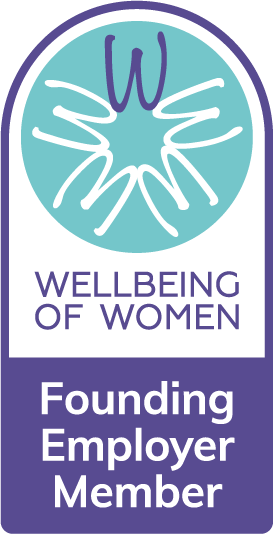The team at iPLATO is committed to ensuring all colleagues feel supported, respected and valued at work, which is why we are delighted to become part the of Wellbeing of Women’s Employer Membership Programme. This is a commitment to providing valuable support to our current and future female colleagues when managing their health.
In the UK, almost six in 10 women over the age of 16 are in work. That’s millions of women making a valuable contribution to their workplace and the overall economy.
At the same time, many will be living with heavy menstrual bleeding, severe period pain, endometriosis or going through the menopause. Others may face issues such as infertility, miscarriage, stillbirth or gynaecological cancers. Women are also more likely to be diagnosed with an anxiety disorder, experience common mental health problems and develop eating disorders.
Sadly, many women don’t feel comfortable talking about their health and wellbeing in the workplace. Of more than 100,000 UK women surveyed as part of the development of the Women’s Health Strategy in England, around one in four said a health condition or disability had affected their earnings or promotion opportunities.
Chloe Lay, Women’s Health Ambassador at iPLATO explains, “we understand the unique health issues women face throughout their lifecycle that can impact their physical and emotional wellbeing, from painful, heavy periods, fertility problems, baby loss, through to gynaecological conditions and the menopause. Many of these phases are widely stigmatised in society still and go unsupported”.
But women’s health is the cornerstone of a healthy society. It can affect everyone, including partners, friends, family, colleagues and bosses, which is why it is so important to ensure the right support is available for all employees in the workplace to better their understanding.
Wellbeing of Women’s Employer Membership Programme is designed to help organisations develop and implement meaningful support for women’s health in the workplace. The programme gives organisations access to a one-stop online health hub filled with practical resources, developed with experts, to help you craft and implement policies and other measures to promote and support people’s gynaecological health in the workplace, enabling them to thrive professionally.
Chloe continues, “I am proud that we have created a Women’s Health Education Policy for our team to feel understood, learn from and grow in compassion for colleagues and others in their life.”
When we focus on helping people to manage their gynaecological health, everyone benefits – people are more likely to stay with their employer and be motivated to do their best work because they feel heard, respected and supported. This creates an open, inclusive and diverse environment that can inspire creativity and innovation.
Founder of the iPLATO Women’s Network, Khalima Khan explains: “Supporting women’s health in the workplace is crucial for promoting overall well-being, productivity, and job satisfaction. When women have access to resources and accommodations for their health needs, such as maternity care, menstrual health support, and mental health services, it fosters a more inclusive and supportive environment. Prioritizing women’s health creates a culture of respect, equality, and empowerment, benefiting both individuals and the organization as a whole! ”
Important Women’s Health Statistics
- 1 in 3 women in the UK will experience a reproductive of gynaecological health issue during their lives
- Only 2.4% of public and charity funded research has been spent on reproductive health and childbirth
- Heavy periods affect 1 in 2 women in the UK
- About 1.5 million women live with endometriosis, a painful and often-debilitating condition, and many are forced to wait almost nine years before they receive a diagnosis
- Around 1 in 7 heterosexual couples will have difficulty conceiving
- A survey for Wellbeing of Women’s ‘Just a Period’ campaign found that nearly half (47%) of the 3,000 women and girls felt their workplace didn’t take them seriously in relation to their period, and more than half (56%) had experienced problems at work due to their period
- Two-thirds of women experience a negative impact at work due to menstruation symptoms and more than half had been unable to go into work at some point due to their symptoms
- Almost one in four women (23%) have considered quitting their job due to the impact of menopause or menstrual symptoms at work
- A poll of 13,000 women in the UK found that more than four in five said their employers provided no support at work for those with menopause symptoms
- The UK loses 150 million working days each year due to poor women’s health and a lack of suitable support
- Endometriosis is estimated to cost the economy £8.2bn a year in treatment, loss of work and healthcare costs
- Large UK firms whose executive boards are 1/3 female are 10 times more profitable on average than all-male boards
- 60% of companies have increased their financial and staffing investments in diversity, equity, and inclusion over the past year. And nearly three in four HR leaders say DEI is critical to their companies’ future success


